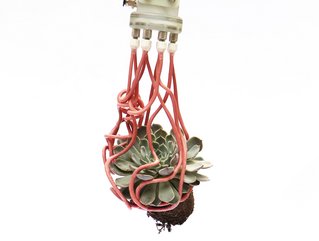Robot tentacles get a grip without need for complex controls

Robot grippers inspired by nature could revolutionise healthcare and agriculture, and other industry sectors that call for a gentle touch.
The current design of robotic grippers rely on embedded sensors, complex feedback loops, or advanced machine learning algorithms - combined with an operator’s skills - to grasp objects. Researchers from the Harvard John A. Paulson School of Engineering and Applied Sciences (SEAS) designed a soft, robotic gripper that uses a collection of thin tentacles to entangle objects like jellyfish collecting prey.
The collection of filaments can grasp and securely hold heavy, irregularly shaped objects. The gripper relies on simple inflation to wrap its tentacles around objects which removes the requirement for sensing, planning, or feedback control.
“With this research, we wanted to reimagine how we interact with objects,” says Kaitlyn Becker, Assistant Professor of Mechanical Engineering at MIT, former graduate student and postdoctoral fellow at SEAS and first author of the paper. “By taking advantage of the natural compliance of soft robotics and enhancing it with a compliant structure, we designed a gripper that is greater than the sum of its parts and a grasping strategy that can adapt to a range of complex objects with minimal planning and perception.”
The gripper’s strength and adaptability come from its ability to entangle itself with the object it is attempting to grasp, say researchers. The foot-long filaments are hollow, rubber tubes. One side has thicker rubber than the other, so it curls like a pigtail when the tube is pressurised.
The curls knot and entangle with each other and the object, increasing the strength of the hold. Each contact is individually weak and won’t damage fragile objects, say researchers. To release the object, the filaments are simply depressurised.
Agriculture and medical sectors to benefit from touch technology
The researchers used simulations and experiments to test the efficacy of the gripper, picking up a range of objects, including various houseplants and toys. Researchers say the gripper could be used in real-world applications to grasp soft fruits and vegetables for agricultural production and distribution and delicate tissue in medical settings.
This new approach combines Professor L. Mahadevan’s research on the topological mechanics of entangled filaments with Professor Robert Wood’s research on soft robotic grippers.
“Entanglement enables each highly compliant filament to conform locally with a target object leading to a secure but gentle topological grasp that is relatively independent of the details of the nature of the contact,” says Mahadevan, the Lola England de Valpine Professor of Applied Mathematics in SEAS, and of Organismic and Evolutionary Biology, and Physics in FAS and co-corresponding author of the paper.
“This new approach to robotic grasping complements existing solutions by replacing simple, traditional grippers that require complex control strategies with extremely compliant, and morphologically complex filaments that can operate with very simple control,” says Wood, the Harry Lewis and Marlyn McGrath Professor of Engineering and Applied Sciences and co-corresponding author of the paper. “This approach expands the range of what’s possible to pick up with robotic grippers.”
The research was published in the Proceedings of the National Academy of Sciences (PNAS) and co-authored by Clark Teeple, Nicholas Charles, Yeonsu Jung, Daniel Baum and James C. Weaver. It was partly supported by the Office of Naval Research, the National Science Foundation, the Simons Foundation, and the Henri Seydoux Fund.






